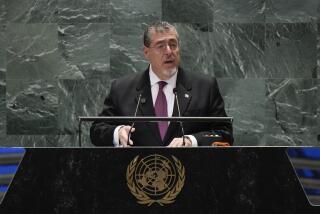NATO to Create New Police Force in Bosnia
- Share via
WASHINGTON — The NATO-led peacekeeping force in Bosnia-Herzegovina plans to create tough new police units to control ethnic disturbances that military troops are not trained or equipped to handle, a senior Clinton administration official said Thursday.
The peacekeeping operation, which has been extended indefinitely, will assemble the police units with personnel from agencies like the Italian Carabinieri and Spain’s Guardia Civil--national law enforcement organizations that are more paramilitary in nature than police in the U.S. The official said Americans are not expected to be recruited.
“We want people who have more balanced capabilities and training than just retreating or killing,” the official said in briefing reporters on the North Atlantic Treaty Organization’s plan to extend the mandate, with few changes, for the existing 30,000-member force. The mandate was to have expired this summer.
This was officially done by NATO ambassadors meeting Wednesday in Brussels. Although the force’s overall strength will be unchanged, the U.S. contingent will shrink from 8,500 to about 7,000 troops, with Europeans making up the difference, the official said.
On related issues, the administration official said the U.S. government supports measures taken by the new government in the Bosnian Serb entity, but is becoming increasingly frustrated by policies of Bosnia’s Muslims and Croats. In a dramatic shift of sentiment, the official said the administration is ready to begin significant foreign aid to the Serbs and is considering a sharp reduction in support for the Muslims and Croats.
Since the bloody ethnic war was halted by the Dayton, Ohio, conference in late 1995, efforts to create a lasting peace and restore prewar ethnic diversity have been thwarted by repeated ethnic clashes, usually touched off when refugees try to return to the homes they were driven out of during the conflict.
In a typical disturbance, residents of an “ethnically cleansed” community, backed by local police of the same ethnic group, use force to prevent the return of refugees of different ethnicity. Although this violence once primarily involved Serbs blocking the return of Muslims and Croats, the official said all three ethnic groups are now guilty of the same practice.
Peacekeeping forces are often unable to cope with these clashes.
The NATO military force is trained for combat, not for controlling civil disturbances, while another agency in Bosnia--the unarmed International Police Task Force--functions only in an advisory role and has no direct law enforcement powers, the official said.
The planned new police force would be well-armed, as are the Carabinieri and the Guardia Civil, and would be backed up by troops if necessary. The official said the international police would try to coax local law enforcement to act. But if that does not happen, the international force would do the job.
The official said the Bosnian Serbs, almost universally blamed as aggressors in the war in Bosnia, have taken significant steps to live up to the Dayton accords since Milorad Dodik was elected prime minister last month. For instance, he said, Dodik has promised to allow 70,000 refugees to return to Bosnian Serb controlled towns by September.
At the same time, he said, he and other administration officials “are increasingly frustrated” by actions of the federation of Muslims and Croats that controls the other half of Bosnia. The Muslims, he said, have capitalized on their status as the war’s chief victims to pass laws restricting other ethnic groups. For instance, he said, the Muslim-led government that controls Sarajevo, the Bosnian capital, has passed laws blocking the return of Serbs, Croats and Jews to prewar homes.
The official said the United States has warned the Muslims that if they do not repeal the offending statute by March 1, the U.S. will begin cutting aid, possibly including the “equip and train” plan intended to upgrade the Muslim-Croat federation’s army to match the better-armed Serbs.
More to Read
Sign up for Essential California
The most important California stories and recommendations in your inbox every morning.
You may occasionally receive promotional content from the Los Angeles Times.













